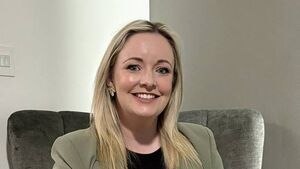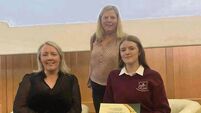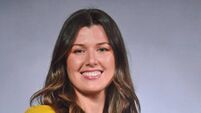Mayo native is co-author of new Junior Cert maths book

Claremorris native Lorna Jordan is the co-author of a new maths book for Junior Certificate students.
A new Junior Cycle maths textbook, co-authored by a Claremorris woman, has arrived on the Irish education market this month, offering what its authors describe as a “differentiated and student-responsive” alternative to existing materials.
Titled ‘Level Up 1’, the book is the first in a five-part series from publishers Educate.ie and is designed to support students from the beginning of secondary school through to Higher Level Leaving Certificate Maths. The textbook is already on booklists for the upcoming school year, with the second book currently in development.
Lorna Joran, who teaches at Ballinrobe Community School, has spent over a year working on the project alongside co-author Shannon Ahern, a Dublin-based teacher well known among colleagues for her online presence and teacher training webinars. The pair collaborated almost entirely online until earlier this year.
“We had a lot of Zooms, WhatsApps, voice notes, video calls, emails – the works,” Lorna told the . “The first time we met in person was only in February when we went to Dublin to meet the publishing team. But by that stage, we knew each other inside out.”
The partnership came about when an editor at Educate.ie found Lorna’s profile on LinkedIn and reached out.
“He liked the look of my background,” Lorna said, “that I’d done research with Oxford University and had just moved back to Ireland. He messaged to ask if I’d any interest in writing a book.”
Her response was an immediate no.
“I had a one-year-old at home and just thought, ‘Absolutely not.’”
But the publisher persisted, suggesting she write a sample chapter.
“I really enjoyed the process. Once I submitted the sample and it got reviewed positively, things took off.”
Lorna and Shannon were matched by the publisher and soon realised they shared a vision for how maths should be taught and, crucially, how a textbook could support that teaching in a modern classroom.
“We both wanted to move away from the traditional textbook model,” Lorna said. “When I was teaching in England for nine years, we weren’t really using textbooks at all. It was all about tailoring lessons to the specific needs of the students in front of you. Shannon felt the same.”
That approach has shaped ‘Level Up 1’. Each exercise in the book is divided into three difficulty levels – Level 1, 2, and 3 – allowing teachers to direct students to work that suits their current level of understanding.
The idea, Lorna said, is not to pigeonhole students but to enable flexible progression. The book’s structure reflects a broader change in how first-year secondary students are grouped.
“When I was in school, you came in and were streamed into classes from day one based on an entrance test,” Lorna said. “That doesn’t happen anymore. Now it’s fully mixed-ability for first year and often most of second year, so teachers are faced with the full range of abilities in every class – kids who don’t know what a fraction is and others who’ve been working with algebra for years.”
The flexibility of Level Up 1, Lorna believes, helps teachers respond to that complexity. But she is aware of concerns around visible differentiation – particularly the risk of students becoming labelled early on.
“There’s definitely a risk of stigma,” Lorna said. “But that’s part of teaching. That happens in classrooms anyway. What we’re doing here is encouraging students to make those choices themselves, to try a Level 3 question and realise it’s too much, and move back to Level 2 without feeling like they’ve failed.”
She stressed that the book doesn’t limit content, only the phrasing and style of the questions.
“Everyone is still doing the same maths. It’s not tracking or streaming – it’s scaffolding.”
The collaboration between the two authors was neatly split. Lorna took responsibility for number, statistics and probability; Shannon focused on shape and algebra. The team worked closely whenever there was topic overlap and to ensure consistency in the new methodologies they were introducing.
“We weren’t just writing another textbook,” Lorna said. “We were trying new things – new ways of levelling exercises, new styles of feedback. So we needed to be fully aligned.”
The response so far has been positive, and schools are already adding the book to their Junior Cycle booklists.
It’s a long way from Facefield, where Lorna grew up. She attended Knock National School before moving on to Mount St Michael Secondary School in Claremorris, graduating in 2010.
From there, she studied English and Maths at NUI Galway with the goal of becoming a teacher. A recruiter from a UK programme visited during her studies, offering incentives to train in England. Lorna applied to Oxford.
“If I was going, I figured I might as well go to the best,” she said.
She completed her teacher training and later a master’s degree in Teaching and Learning at Oxford University. Her research there focused on feedback and assessment in mathematics – skills she believes are at the core of the ‘Level Up’ series.
She spent nine years teaching in Oxford before moving back to Ireland in 2021, getting married and settling in Claremorris, and now teaches at Ballinrobe Community School.
Her immediate plan is to finish the second textbook – ‘Level Up 2’, aimed at higher-level Junior Cycle students – before the arrival of her second child.
Beyond that, she and Shannon are preparing to write three Leaving Certificate books, which will launch once the Department of Education finalises the new syllabus. One volume will be aimed at Ordinary Level students, while two will cater to Higher Level learners.
In terms of compensation, the arrangement with Educate.ie is royalty-based. The authors will receive a percentage of sales, split equally between them. While they have not yet received any earnings from the book, Lorna described the project as more of a passion than a financial venture.
“I’m not doing it for the money,” she said. “I’m doing it because I want to have an impact on the way maths is taught.”
That teaching landscape is rapidly evolving, particularly with the growing presence of artificial intelligence tools like ChatGPT in the classroom. Lorna, however, is not concerned.
“ChatGPT is very bad at maths,” she said. “It’s a language model, not a maths model. It can phrase things nicely but it makes mistakes all the time. I’ve had students try to use it for homework and the results are a disaster.”
Shannon, she added, is an expert in educational AI and shares the view that AI tools are far from capable of replacing core mathematical thinking.
“They can’t replicate problem-solving or intuition,” Lorna said. “They can’t do what we’re trying to teach students to do.”
She sees value in exploring how AI might supplement education, but not replace it. And she’s particularly interested in how the upcoming Leaving Cert reforms are shifting the focus away from rote memorisation toward actual application.
“They’re talking about moving away from theorems – not removing them entirely, but focusing on using them to solve problems rather than just learning them off,” she said. “The way things are marked now, if you forget one step, you’ve lost all your marks. That’s not a useful way to assess understanding.”
Another reform being considered is the removal of the 25 bonus points currently awarded to students who pass Higher Level maths – a proposal Lorna strongly supports.
“It’s become this monster of a subject,” she said. “Students are clinging to it just for the points, even when it’s not the right fit for them. They’re paying huge money for grinds, and they’d be far better off putting that time into a subject they actually enjoy.”
Lorna believes that removing the bonus points would reduce unnecessary pressure and help students choose subjects based on aptitude and interest, not desperation.
Looking ahead, Lorna is focused on getting ‘Level Up 2’ to print and preparing for the Leaving Certificate curriculum changes. And although the workload of teaching, writing, and raising a young family is substantial, Lorna is clearly energised by the work.
“It’s been exhausting at times,” she said. “But when I see the finished book – when I see it on a shelf, and know that it might help a student understand something they’ve struggled with – that makes it all worth it.”





